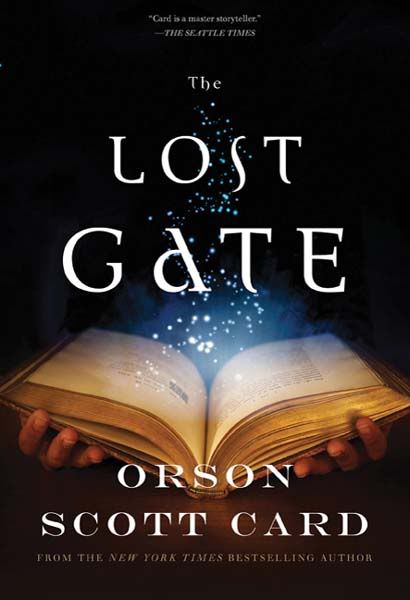
The Lost Gate
Orson Scott Card
Danny North knew from early childhood that his family was different and that he was different from them. While his cousins were learning how to create the things that commoners called fairies, ghosts, golems, trolls, werewolves, and other such miracles that were the heritage of the North family. Danny worried that he would never show a talent, never form an outself..
He grew up in the rambling old house, filled with dozens of cousins and aunts and uncles, all ruled by his father. Their home was isolated in the mountains of western Virginia, far from town, far from schools, far from other people.
There are many secrets in the house and many rules that Danny must follow. There is a secret library with only a few dozen books, none of them in English – but Danny and his cousins are expected to become fluent in the language of the books. While Danny’s cousins are free to create magic whenever they like, they must never do it where outsiders might see.
Unfortunately, there are some secrets kept from Danny, as well. And that will lead to disaster for the North family.
Orson Scott Card creates an astounding urban fantasy about a clan of mages in exile in our world, living in uneasy truce with other clans until Dan’s birth brings the flames of open war back to life. For Dan North is a gatemage, the first in a thousand years, and he can open the locks that keep the North clan, and their enemies, away from their homeland of Westil.
You should all know before I get into the reviewing bit of this post that Ender’s Game, also by Orson Scott Card, is arguably my favourite book of all time. It differs on what I’ve been reading lately, of course, but Card’s Ender series is one that I fall back on whenever I need a book to reread. So I was incredibly biased before even opening the cover.
But I think even if Card didn’t write one of my favourite books ever, I would love this book. It’s somewhere in the midst of an unruly cross between Tithe by Holly Black and American Gods by Neil Gaiman. You’ve got the main character, Danny North, who doesn’t know what he is and there’s this whole other world that he’s a part of unknown to common humanity, like in Tithe, but it’s the same kind of jaded, fallen deities still fighting to keep their godhood in a world that no longer supports it that can be seen in American Gods. I love the depth and care that goes into building worlds like this and Card does not disappoint.
There’s also another story in this book. It’s not as prevalent as Danny North’s because he is the main character, but this other story is related to Danny’s path and that is the story of Wad, a young man with old eyes born from a tree and secreted into the kitchens of a palace in kingdom on a world that was once tied to this one. For the most part, he doesn’t remember who he was before, but he has abilities far beyond those of the people around him and he has ghosts in his head that he can feel sometimes.
Again, he’s not as prevalent in this book as Danny, so it took me longer than it probably should have to figure out his role in all of this. Towards the beginning of the book, I found that his chapters were slowing me down in my understanding of how the story fit together, but once I figured out the connection, I was actually looking forward to his chapters more than Danny’s. This didn’t detract from my enjoyment of the book at all, but you should be aware that the beginning might be a bit slow going with Wad in the mix until you figure it out.
If you are a fan of mythological fiction, you should check this book out. If you are a fan of self-discovery stories featuring teenaged folk in fantastical settings, you should check this book out. It was a great read and has encouraged me to seek out works by Card beyond the Ender series.






No comments:
Post a Comment